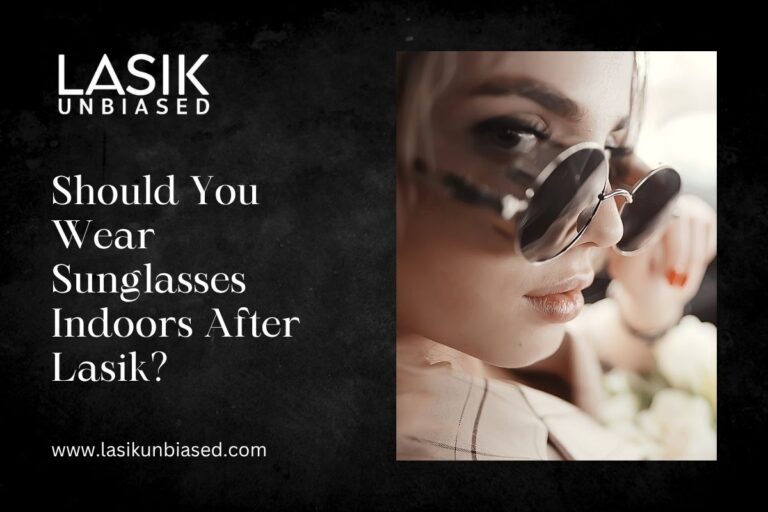You usually don’t need to wear sunglasses indoors after LASIK unless you have significant light sensitivity or are exposed to unusually bright lighting.
Most patients only need sunglasses outside, especially during the first few weeks of healing, but there are some exceptions where indoor use can help with comfort and recovery.
Introduction: Navigating Light Sensitivity After LASIK
LASIK surgery offers life-changing vision correction, but recovery comes with a few new habits, including how and when to protect your eyes from light. Many patients wonder: Should I wear sunglasses indoors after LASIK, or is that just for outdoors? This guide explains when indoor sunglasses make sense, why light sensitivity happens, and how to keep your eyes comfortable and healthy as you heal.
Understanding Light Sensitivity After LASIK
Why Are Eyes Sensitive to Light After LASIK?
LASIK reshapes your cornea to correct vision, but it also temporarily disrupts the eye’s natural protective barrier. This may cause increased light sensitivity (photophobia), particularly during the initial days following surgery. Bright lights—whether sunlight, fluorescent bulbs, or screens—can feel harsh or even painful until your eyes recover.
How Long Does Light Sensitivity Last?
- The majority of patients experience sensitivity during the first 24 to 48 hours.
- Some people experience mild sensitivity for up to a week.
- For a small number, it can last several weeks, especially in very bright environments.
Do You Need Sunglasses Indoors After LASIK?
General Recommendation
You do not need to wear sunglasses indoors after LASIK as a routine, unless you experience significant light sensitivity or are exposed to intense artificial lighting. For most, regular indoor lighting is not harmful or uncomfortable once the initial sensitivity fades.
When Should You Wear Sunglasses Indoors?
There are a few scenarios where wearing sunglasses indoors after LASIK makes sense:
- If you feel discomfort from indoor light: In the first few days after LASIK, sunglasses can make it easier to handle bright light and feel at ease.
- If you work under harsh or bright lights: Occupations involving strong LED, fluorescent, or studio lighting may warrant extra eye protection.
- If your doctor recommends it: Some patients with unusually high sensitivity or specific healing needs may be advised to use sunglasses indoors for a short time.
When Are Indoor Sunglasses Not Needed?
- As long as typical indoor lighting doesn’t bother your eyes.
- Once your light sensitivity fades (usually after the first few days).
- If you’re not exposed to direct sunlight or intense artificial glare indoors.
Benefits of Wearing Sunglasses After LASIK
Outdoor Protection Is Essential
Wearing sunglasses outdoors after LASIK is non-negotiable, especially during the first 2–4 weeks. Here’s why:
- Blocks UV rays: Protects healing corneal tissue from sun damage.
- Reduces glare and discomfort: Makes outdoor activities more comfortable as your eyes adjust.
- Shields from dust and irritants: Acts as a barrier against wind, debris, and allergens that could disrupt healing.
Indoor Benefits (When Needed)
- Reduces discomfort from bright indoor lights.
- Helps ease eye strain and reduce headaches for those who are light-sensitive.
- Reminds you not to rub or touch your eyes during early healing.
- Can help in dry environments by reducing airflow over the eyes (e.g., air conditioning or heating).
Risks of Overusing Sunglasses Indoors
While sunglasses can help with comfort, wearing them indoors for long periods can have downsides:
- May slow adaptation to normal light: Your eyes need to gradually adjust to typical lighting conditions.
- Can cause unnecessary dependency: You might become reliant on sunglasses even when not needed.
- May mask other issues: Persistent sensitivity could signal a complication—always check with your doctor if it lasts more than a week.
How to Choose the Right Sunglasses After LASIK?
Key Features to Look For
- 100% UVA and UVB protection: Useful for shielding your eyes outdoors during recovery.
- Polarised lenses: Reduce glare and improve comfort, especially outdoors.
- Wraparound frames: Offer maximum coverage from all angles.
- Comfortable fit: Should not press on healing areas or irritate your skin.
Should You Use Special Sunglasses Indoors?
- Indoors, any comfortable, lightly tinted sunglasses can help if you’re sensitive.
- Outdoors, always use sunglasses with full UV protection and good coverage.
Quick Tips for a Comfortable Recovery
- Go by your surgeon’s guidance for eye protection and healing.
- Avoid direct sunlight indoors (e.g., sitting by a bright window) during early recovery.
- To combat dryness and irritation, regularly use lubricating eye drops as directed by your eye care professional.
- Don’t rub your eyes, even if they feel itchy or dry.
- Gradually increase your exposure to normal lighting as your eyes heal.
Wrapping Up: Should You Wear Sunglasses Indoors After LASIK?
You don’t need to wear sunglasses indoors after LASIK unless you’re experiencing significant light sensitivity or are exposed to unusually bright lights. Most people only need them outside, especially in the first few weeks, to protect against UV rays and support healing. If you’re unsure or your sensitivity lasts longer than expected, check with your eye doctor for personalised advice.
Protect your eyes, listen to your body, and enjoy your new vision—indoors and out. If you have questions about LASIK recovery or choosing the right sunglasses, reach out to your surgeon or eye care provider for guidance. Your comfort and long-term eye health are worth it.
Frequently Asked Questions About Sunglasses and LASIK Recovery
How long should I wear sunglasses after LASIK?
- Outdoors: At least 2–4 weeks, or as long as your doctor advises.
- Indoors: Only as long as you feel sensitive to light, usually just the first day or two.
Can I use regular sunglasses after LASIK?
Yes, as long as they offer 100% UV protection and fit comfortably.
What if I still have light sensitivity indoors after a week?
Contact your eye doctor to rule out complications or delayed healing.


